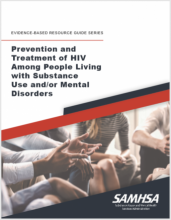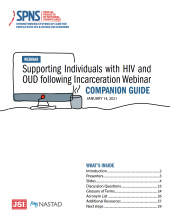
Individuals who have HIV who also use drugs experience increased age-matched morbidity and mortality in comparison with those with HIV who do not use drugs.



Individuals who have HIV who also use drugs experience increased age-matched morbidity and mortality in comparison with those with HIV who do not use drugs.
This document describes the critical role that peers have in developing and delivering care for people with HIV and OUD and how a state’s Medicaid program can serve as an essential fiscal resource in supporting peer services.
This discussion guide is intended to elicit a comprehensive and concrete conversation about language, stigma, and discrimination as a means of strengthening care systems and ensuring that people who seek care for HIV and/or substance use disorders, including opioid use disorder, are treated with
This month’s Connecting Care episode discusses the impact of structural racism at the intersection of HIV and OUD care and opportunities to think outside of the box to effect change.
This glossary includes terms describing key concepts and components of the HIV and opioid use disorder (OUD) care and treatment systems.
For Boston Health Care for the Homeless nurse Megan Sonderegger, providing client-centered care means literally meeting her clients where they are.
There are so many factors that impact adherence and health outcomes. During this Connecting Care podcast, Drs. Alex Walley, Jessica Taylor, and Sim Kimmel discuss HIV prevention and treatment among people who inject drugs.
Clinicians can now access up-to-date evidence-based office-based addiction treatment recommendations for treating opioid use disorder (OUD) on a smartphone app.